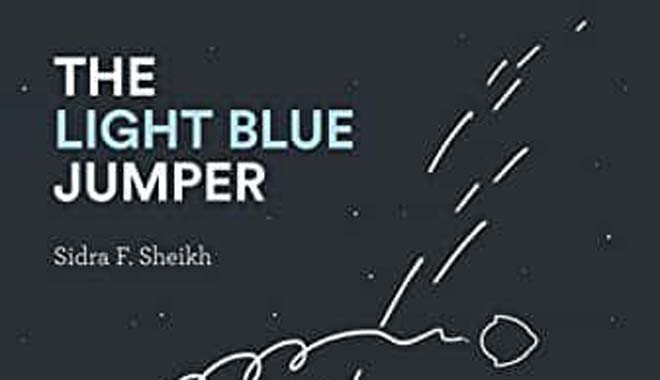
A space-age novel that sneaks in clues to its author’s Pakistani identity without going overboard: perfect

What would you make of a work of fiction titled The Light Blue Jumper penned by a Pakistani? Could it be about a family heirloom misplaced and then rediscovered after the partition of the Subcontinent? Or a love story symbolised by a blue jumper knitted during the monsoon season that is a salient feature of most Pakistani literary works? I am happy to report that it is neither. The book cover bills itself as a comedy of errors set in space, and every page of the fictional novel of missteps stays true to its description.
Sidra F. Sheikh’s first novel is an attention-grabber from the start. First of all, there is the matter of the jumper. The ah-ha moment arrives a few pages into the story and the who, what, where and whys are resolved to present Zaaro, the pale blue round and bald protagonist* with watery blue eyes.
Zaaro, aka the Light Blue Jumper, is the unwitting antihero. Sheikh deftly surrounds Zaaro’s timid persona with a coterie of strong-willed characters, bringing into stark relief the comic absurdity of the situation. Zaaro’s unintentional claim to the post of the saviour of the universe is the ability to transport himself across time and space: the "stuff of myths and legends".
Though The Light Blue Jumper is a sci-fi novel in the tradition of Douglas Adam, Zaaro’s personality bears an uncanny resemblance to the character of Dobby, the shivering elf-slave bound by custom, who comes to Harry Potter and Co.’s aid in J. K. Rowling’s famous saga of an alternate magical world. For this reader, the British connection does not end there. Zaaro might have been placed in a world light years away in time and distance by the author, but his staunch loyalty to the customs of his people is endearingly similar to the bumbling characters in P. G. Wodehouse’s comic tales of misadventures.
The focus on Zaaro does not mean that the rest of the characters are relegated to the shadows. Sheikh uses the multiple points of views as her prime stylistic device, building up her narrative and characters through their own varied perception of events. It is a risky storytelling tool, one that could potentially have dragged down the novel because of the sheer number of characters given space to voice their thoughts. Interestingly, it works in favour of the author. The different interpretations of a singular event act as a kaleidoscope, one that plays upon the characters’ Achilles heels to provide comic relief.
Truth be told, the plot twists and turns a bit too much; and yet somehow the reader’s curiosity is piqued enough to read on till the end and find out how this motley crew has fared against the authoritative interplanetary forces that use biochemical weapons and mind-control to cement their despotic rule. To keep this review free of spoilers, let’s just say that there is a sequel in the offing…
As novels by Pakistani authors go, Sidra Sheikh has chosen to venture into the territory of sci-fi, a choice that is in contrast to the more common brooding expositions on identity, nationalism and the post-colonial self. Yet, those oft-explored themes of colonialism, marginalisation, and subjugation are very much entrenched into the plot of the humorous sci-fi novel. The only difference is Sheikh’s nuanced and slightly satirical approach towards the grim threats of rising intolerance and infringement of basic rights. At the end of the day, The Light Blue Jumper stays grounded to the reality of the global political climate even while its protagonist floats through space.
The clean and crisp use of the English language is also a welcome breath of fresh air.
English has been shedding its pedantic shackles as a written and spoken language in Pakistan. Mass media can provide an entertaining example of its colloquial usage by young Pakistanis. It is befitting that literature in English by Pakistani writers is freeing itself from the imposing trappings of English as the language of the colonial masters and owning it as a global idiom instead.
One could unearth as many literary allegories in this fast-paced account of miscommunication amongst the stars as one wished. Existentialism and the absurdity of life could be two … except the confusion between human/non-human/kind-of-human forms of life keeps the novel light-hearted enough to not turn Zaaro into a melancholic Shakespearean hero. Or one could simply read The Light Blue Jumper as an account of good intentions gone awry in an intergalactic comic thriller.
Whether the resistance movement is successful in their mission against despotic forces or not, Zaaro Nian is sure to win readers’ hearts. Besides, how can one not warm up to an outer space inhabitant who loves chicken tikka masala? A literary work that sneaks in clues to its author’s Pakistani identity without going overboard: perfect.
For a space-age novel that uses the pop-cultural reference of Game of Thrones, an Emoji keyboard would have been a perfect accompaniment to aptly capture the lightness of being The Light Blue Jumper.
*This reviewer has refrained from labeling Zaaro Nian as a person/creature to avoid hurting any Zaaronian sensibilities.